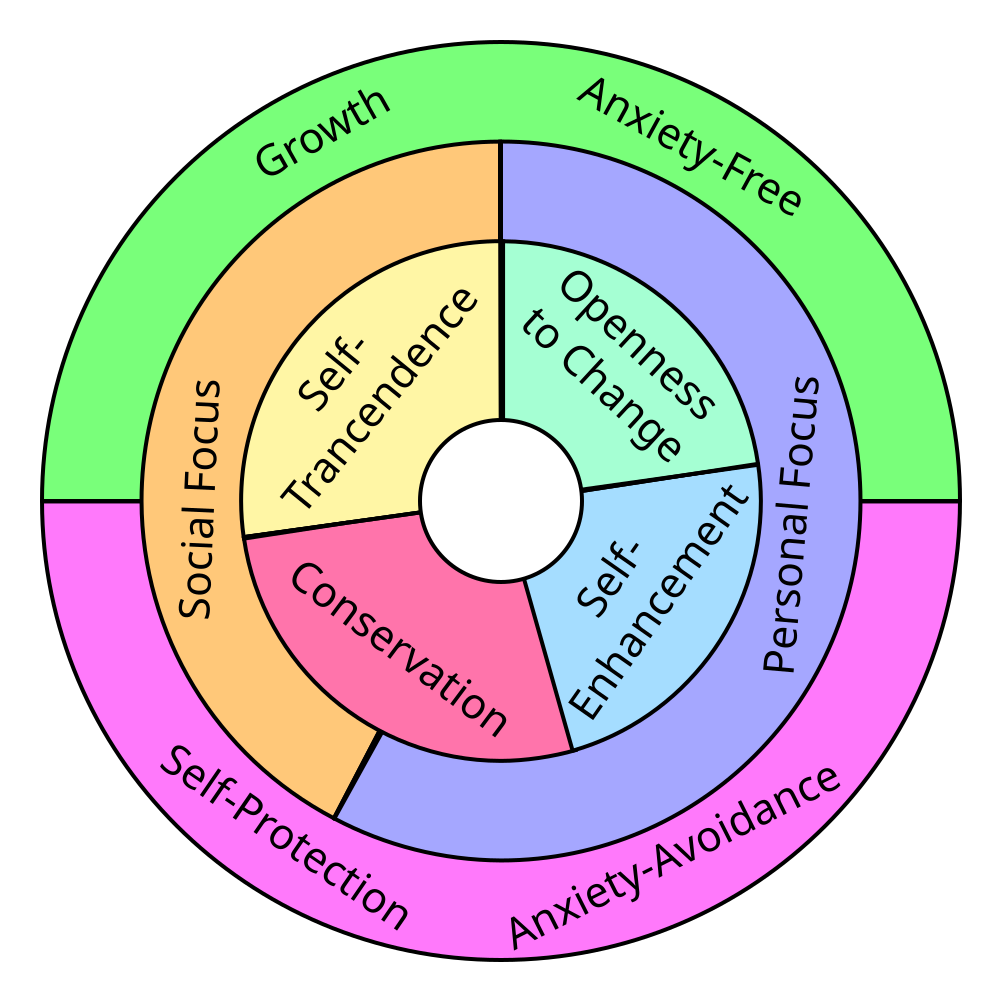IB Syllabus focus:
‘Values shape priorities, judgements, perspectives and choices. They are individual yet socially shaped, visible in communication, media, policies and actions. Conflicting values often create tensions between people and organizations.’
Values play a central role in shaping how individuals and societies interact with the environment. They influence decision-making, policies, and everyday behaviours, often creating areas of cooperation or conflict.
Understanding Values in Environmental Contexts
Defining Values
DEFINITION
Value: A belief or principle considered important by an individual or group, guiding judgements, decisions, and actions.
Values underpin how people prioritise environmental, social, or economic concerns. They are deeply personal yet also socially influenced through culture, education, religion, and political systems.

This circumplex model organises broad human value domains (for example, self-transcendence, openness to change, conservation, self-enhancement) and shows their patterned relationships that guide priorities and choices. It goes slightly beyond the syllabus by naming specific value domains, but it is helpful for seeing how values underpin perspectives. Source.
Individual vs. Socially Shaped Values
Individual values reflect personal experiences, upbringing, and education.
Socially shaped values develop from shared culture, laws, traditions, and community norms.
Even though values feel personal, they rarely form in isolation. They evolve within social contexts, reinforced through media, education, religion, and law.
Effects of Values on Perspectives
Shaping Priorities and Judgements
Values influence how people assign importance to issues. For example:
A society emphasising economic growth may prioritise industrial development.
A culture valuing environmental preservation may restrict land use or resource exploitation.
Creating Perspectives and Choices
Perspectives emerge when values are applied to specific environmental contexts. Choices in policy or personal lifestyle reflect underlying values:
Supporting renewable energy reflects a long-term sustainability value.
Prioritising cheap fossil fuels shows a short-term economic value.
Expression of Values
Communication
Values are expressed through language in debates, discussions, and arguments. The framing of an environmental issue often reveals the speaker’s value base.
Media
Mass media broadcasts and reinforces values. For example:
Campaigns emphasising the dangers of plastic waste highlight ecocentric values.
News prioritising economic costs of conservation reflects anthropocentric values.
Policies
Government laws and regulations embody societal values:
A ban on single-use plastics reflects ecological priorities.
Subsidies for coal mining reflect economic and industrial priorities.
Actions
Behaviour is the clearest expression of values. Individuals may:
Reduce meat consumption due to ethical or ecological values.
Continue high-consumption lifestyles due to consumerist values.

Students at a climate strike hold hand-made placards (“THE WORLD IS DYING — STOP DENYING”), showing values communicated publicly and enacted through collective action. This directly visualises how values drive advocacy and lifestyle choices. Source.
Conflicting Values
Tensions in Society
Conflicts emerge when values differ:
Conservation groups vs. industrial developers over land use.
Indigenous values prioritising stewardship vs. state policies prioritising extraction.
These tensions highlight that values are not just personal but often linked to power, economics, and cultural identity.
Sources of Conflict
Economic vs. Environmental Values: Trade-offs between growth and preservation.
Individual vs. Collective Values: Personal freedom vs. societal responsibility.
Short-term vs. Long-term Values: Immediate profit vs. intergenerational sustainability.
Processes of Value Transmission
Education
Schools and universities transmit values by teaching about sustainability, economics, or development. Curricula shape how the next generation interprets environmental challenges.
Culture and Religion
Cultural traditions and religious teachings establish moral frameworks for valuing the environment. For example, some religions view nature as sacred, fostering ecocentric attitudes.
Governance and Law
Legal systems formalise collective values into enforceable rules. Environmental protection laws reveal a shift towards valuing sustainability and public health.
Observing Values in Action
Case Studies of Expression
Values are not abstract; they manifest visibly in society:
Climate change debates: Economic stability vs. ecological urgency.
Urban planning: Housing expansion vs. conservation of green spaces.
Resource management: Water access prioritised for industry vs. agriculture vs. community needs.
Value Conflicts on Global Scale
Developed nations may emphasise reducing carbon emissions.
Developing nations may prioritise poverty alleviation and economic expansion.
This creates tensions in global negotiations such as the UN Climate Conferences.
Analytical Tools for Studying Values
Surveys
Surveys help capture and compare values across groups. Questions about priorities reveal underlying value systems shaping opinions and behaviours.
Behaviour-Time Graphs
These graphs show how values change lifestyle choices over time. For instance:
A decline in cigarette use reflects growing health values.
Increased vegetarianism reflects ethical and environmental values.
Key Takeaways for Students
Values shape priorities, judgements, perspectives, and choices.
They are personal yet socially constructed, influenced by culture, law, and education.
Expression occurs through communication, media, policies, and individual actions.
Conflicting values create tensions between people, organisations, and nations.
Understanding values is crucial for analysing environmental debates and policy-making.
FAQ
Values are embedded in advertising, films, television shows, and even social media platforms. These cultural outputs normalise certain behaviours while discouraging others.
For example, sustainable lifestyles can be promoted by documentaries highlighting ecological challenges or by influencers advocating low-waste practices. Conversely, advertising luxury consumption reinforces consumerist values. Media therefore acts as a channel for reinforcing or shifting collective perspectives.
People can hold mixed values depending on the situation. For instance, someone may value economic affordability while also supporting conservation.
These contradictions arise because values are influenced by overlapping cultural, social, and personal experiences. Context determines which value is prioritised, leading to inconsistency in decision-making or lifestyle choices.
Generations develop distinct values due to exposure to unique historical events, technologies, and cultural shifts.
Older generations may prioritise stability and tradition, reflecting past economic or political struggles.
Younger generations may emphasise sustainability and equity, influenced by climate change awareness and digital connectivity.
Generational contrasts can intensify tensions in policy-making or community decisions.
When nations negotiate, their differing values shape their priorities.
Developed countries often highlight emission reduction and ecological restoration.
Developing countries may emphasise poverty reduction, employment, and growth.
These conflicts slow consensus, as agreements must balance divergent values. This is why compromises, like differentiated responsibilities, are common in treaties.
Values can shift both gradually and suddenly.
Gradual change occurs through education, cultural evolution, and generational turnover.
Rapid shifts happen after crises or events, such as natural disasters, environmental campaigns, or technological breakthroughs.
Both pathways demonstrate how values are dynamic and responsive to context.
Practice Questions
Question 1 (2 marks)
Define the term value in the context of Environmental Systems and Societies, and explain how values influence environmental decision-making.
Mark Scheme
1 mark for providing a correct definition of value (e.g. a belief or principle considered important by an individual or group, guiding judgements and actions).
1 mark for explaining its influence on environmental decision-making (e.g. values shape priorities, leading to choices such as prioritising conservation or economic growth).
Question 2 (5 marks)
Using examples, explain how conflicting values can lead to tensions between groups or organisations when addressing environmental issues.
Mark Scheme
1 mark for recognising that conflicting values create disagreements or tensions.
1–2 marks for explaining specific value conflicts (e.g. economic vs. environmental priorities; individual vs. collective responsibility).
1–2 marks for relevant examples (e.g. industrial developers vs. conservation groups; indigenous communities vs. state governments over land use).
Maximum 5 marks awarded for clear linkage between the values, the conflict, and the resulting tension.

